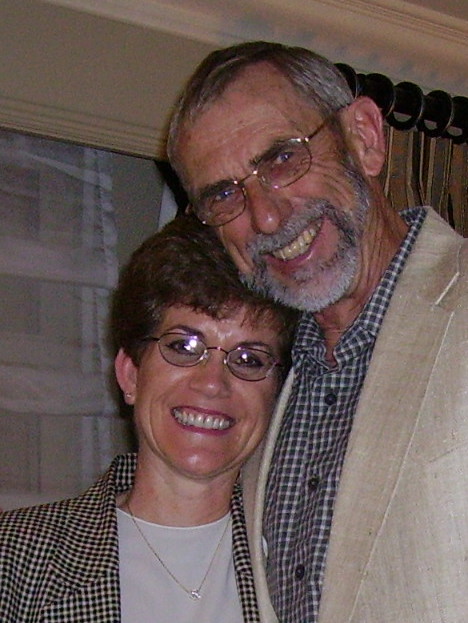Arnold Hampel, '63, Continues Legacy of Wife Denise Kennedy, '84, M.B.A. '95
By Tony Scott

Denise Kennedy and Arnold Hampel
Arnold “Arn” Hampel, ’63, is ensuring that the legacy of his late wife, Denise Kennedy, ’84, M.B.A. ’95, and their shared advocacy and passion for science and education, lives on at NIU through gifts of scholarships and student support.
Kennedy’s healthcare career began as a patient caregiver. She then went on to hold leadership roles in operations management, quality and process improvement, business development, services management and marketing and concluding as a university professor. Hampel, in addition to being a Huskie alumnus, served as a professor in the Department of Biology and the Department of Chemistry and Biochemistry from 1970 to 1999.
The couple’s advocacy and passion for science and education is continuing, through Kennedy’s legacy gifts to NIU.
“In summary, why have Denise and I supported NIU? It provides an outstanding education to students and has extremely talented professors who care about students,” Hampel said.
In addition to a pair of scholarships – the Dr. Denise Kennedy Endowed Scholarships in Health and Human Sciences and in Business – funded by Kennedy’s estate, the couple’s philanthropic support funds annual awards for the Conference on Undergraduate Research and Engagement (CURE), NIU's annual undergraduate research symposium.
Students receiving high rankings on their presentation in their respective categories at the CURE symposium will receive a monetary award and the opportunity to have their poster published in Huskie Commons, thanks to the Dr. Arnold Hampel and Dr. Denise Kennedy CURE Award Fund.
Kennedy grew up in Ottawa, Illinois, where her father was union president at the Libby Owens glass company. She worked weekends at the local Ottawa hospital to pay her bills while attending NIU for her bachelor’s degree.
“NIU offered Denise education, opening up a world of opportunity,” Hampel said. “Denise excelled in math, science and English in preparation for her chosen medical career path.”
After earning her bachelor’s degree, Kennedy graduated from the respiratory therapy program at Northwestern and worked 11 years as a respiratory therapist at a number of hospitals, mostly in trauma or emergency room settings.
“While that work was both exciting and immensely rewarding for her, it was strenuous, exhausting both physically and mentally,” Hampel said.
She decided to go back to school, where she earned her M.B.A. at NIU, with the goal of leaving the bedside and going into medical administration, Hampel said.
“Denise always expressed gratitude for her outstanding educational experience at NIU – both undergraduate and graduate,” Hampel said. “She was especially grateful for professors Carol DeMoranville and Denise Schoenbachler.”
After earning her M.B.A., Kennedy worked as director of the Patient Experience Office at Mayo Clinic in Arizona. Hampel praised her work at Mayo, where a patient experience model Kennedy developed was adopted and implemented by the entire Mayo Clinic system. The paper describing the model was adopted and implemented by medical facilities worldwide, and it was chosen as paper of the year by the American College of Healthcare Executives. She was also appointed as faculty to the Mayo Medical Clinic College of Medicine, one of the few administrators to be selected as faculty.
When the CEO of Mayo Clinic in Arizona was tasked with organizing a joint medical school with Mayo and Arizona State University (ASU), he hired Kennedy for the school’s faculty. For the last five years of her career, Kennedy was clinical assistant professor at ASU, where she also earned a doctorate.
“In addition to teaching and continuing her highly successful research program, she directed the Graduate Student Capstone program in her department where she helped launch many highly successful careers,” Hampel said.
Hampel grew up on a farm near Burlington, Illinois, and attended NIU while doing farm work.
“I commuted to class at NIU after milking cows, cleaning the barn, etc. and then drove back to the farm to do it all again in the evening,” he said. “Weekends and holidays were all farm work. Thus, my NIU experience was limited to the classroom interacting with professors. All were outstanding!”
Like Kennedy’s experience, Hampel said NIU offered him a plethora of opportunities.
“It was another world when I went to class at NIU, a world of immense possibility,” he said. “It was pure joy to go to class, to listen, study, and learn. NIU offered a world of opportunity and freedom. I earned an excellent reputation with my professors.”
After graduating from NIU, Hampel attended the University of Wisconsin to earn his Ph.D. in biochemistry. While at Wisconsin, Hampel developed a method to crystallize nucleic acids allowing X-ray diffraction to determine three dimensional structures, which captured worldwide attention. He also worked with Nobel Prize winning biochemist Har Gobind Khorana as part of a team to make the nucleic acid codon assignments.
Hampel spent a post-doctoral term in the biomedical division at Los Alamos Scientific Laboratory, and then returned to NIU where he said he was hired on the spot as a member of the Department of Biology and Department of Chemistry and Biochemistry.
“When I applied for tenure and promotion at NIU, I was likely one of the few applicants to have letters of recommendation from two Nobel laureates,” he said.
While at NIU, he made another significant discovery while researching RNA, in relation to treating AIDS.
“I found a catalytic RNA and designed it to cleave target RNA molecules such as found in HIV1, which causes the AIDS virus,” he said. “I used it to target and destroy the AIDS virus, obtained FDA approval for clinical trials, and it was inserted into bone marrow stem cells of an AIDS patient by my collaborators at the University of California-San Diego. Unfortunately, the delivery method for inserting the gene for my catalytic RNA did not work well at that time. We were only able to get low levels of expression – not enough to destroy the virus in a human.”
While at NIU, Hampel was recruited by other institutions, but he said he was supported by university leadership and they kept him on staff.
Hampel said he is incredibly grateful for his time at NIU and for all NIU has given to him and to Kennedy.
“I could never repay this outstanding university for all it has done for me,” he said.
